过去分词作宾补
- 格式:doc
- 大小:34.00 KB
- 文档页数:3
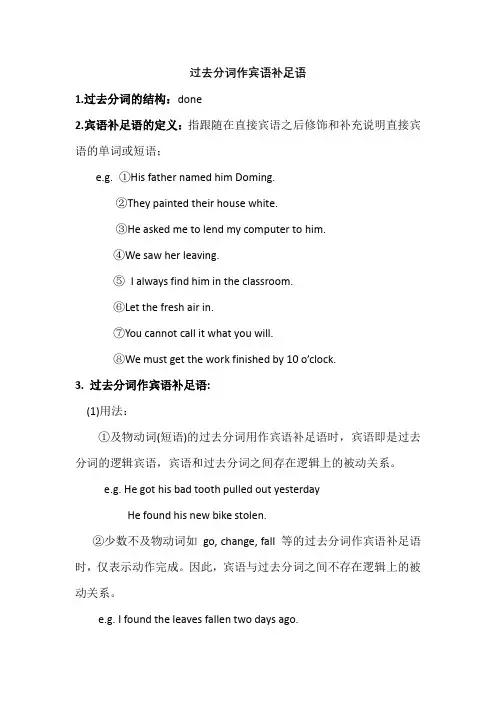
过去分词作宾语补足语1.过去分词的结构:done2.宾语补足语的定义:指跟随在直接宾语之后修饰和补充说明直接宾语的单词或短语;e.g. ①His father named him Doming.②They painted their house white.③He asked me to lend my computer to him.④We saw her leaving.⑤I always find him in the classroom.⑥Let the fresh air in.⑦You cannot call it what you will.⑧We must get the work finished by 10 o’clock.3. 过去分词作宾语补足语:(1)用法:①及物动词(短语)的过去分词用作宾语补足语时,宾语即是过去分词的逻辑宾语,宾语和过去分词之间存在逻辑上的被动关系。
e.g. He got his bad tooth pulled out yesterdayHe found his new bike stolen.②少数不及物动词如go, change, fall 等的过去分词作宾语补足语时,仅表示动作完成。
因此,宾语与过去分词之间不存在逻辑上的被动关系。
e.g. I found the leaves fallen two days ago.She found her necklace gone on her way home.③动词seat, hide, dress 等的过去分词作宾语补足语一般表示宾语的状态,而不表示被动或完成的意义。
e.g. On coming in, I found a girl seated in the corner.I like her dressed in red.(2)使用情况①用在部分系动词(keep, leave)之后表状态或是被动;e.g. They kept the door locked for a long time.Don’t leave the windows broken like this all the time.②部分使役动词(get, have, make, etc.)之后表被动;e .g. I have had my bike repaired.I raised my voice to make myself heard.③像Watch, notice, see, hear, listen to, feel, find等动词之后表被动或是状态;e.g. When we got to school, we saw the door locked.We can hear the windows beaten by the heavy rain drops.④像want, wish, like, expect, order等动词之后表被动;e.g. The teacher won’t like the problem discussed at the moment.I want the suit made to his own measure.⑤用于“with +宾语+宾语补足语”的结构表被动或完成。
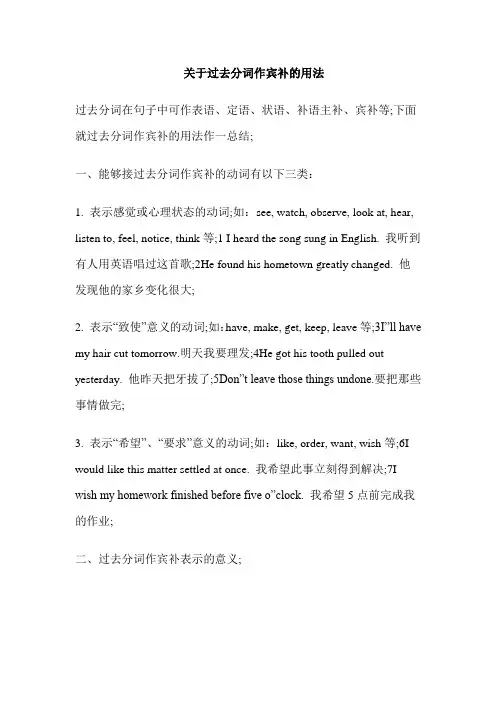
关于过去分词作宾补的用法过去分词在句子中可作表语、定语、状语、补语主补、宾补等;下面就过去分词作宾补的用法作一总结;一、能够接过去分词作宾补的动词有以下三类:1. 表示感觉或心理状态的动词;如:see, watch, observe, look at, hear, listen to, feel, notice, think等;1 I heard the song sung in English. 我听到有人用英语唱过这首歌;2He found his hometown greatly changed. 他发现他的家乡变化很大;2. 表示“致使”意义的动词;如:have, make, get, keep, leave等;3I”ll have my hair cut tomorrow.明天我要理发;4He got his tooth pulled out yesterday. 他昨天把牙拔了;5Don”t leave those things undone.要把那些事情做完;3. 表示“希望”、“要求”意义的动词;如:like, order, want, wish等;6I would like this matter settled at once. 我希望此事立刻得到解决;7I wish my homework finished before five o”clock. 我希望5点前完成我的作业;二、过去分词作宾补表示的意义;1. 过去分词作宾补表示被动关系,其动作先于谓语动作;如例句1,过去分词sung的动作显然先于谓语动作heard;例句2,过去分词changed 的动作显然先于谓语动作found;2. 过去分词作宾补时,过去分词所表示的动作一定和宾语有逻辑上的动宾关系;如例句4,动宾关系是pull out his tooth;例句6,动宾关系是settle this matter;三、过去分词作宾补时,要注意几种情况;1. 使役动词have接过去分词作宾补有两种情况;第一,过去分词所表示的动作由他人完成;如:He had his money stolen.他的钱给偷了;被别人偷去了第二,过去分词所表示的动作由句中的主语所经历;如:He had his leg broken.他的腿断了;自己的经历2. 过去分词在原句中作宾补时,如果原句变为被动语态,那么过去分词就在新句中作主补了;如:The big fire is reported controlled.据报道这场大火已经得到控制;The meeting room was found thouroughly cleaned and everything arranged in good order.人们发现会议室被彻底打扫了,一切都布置得井井有条;。
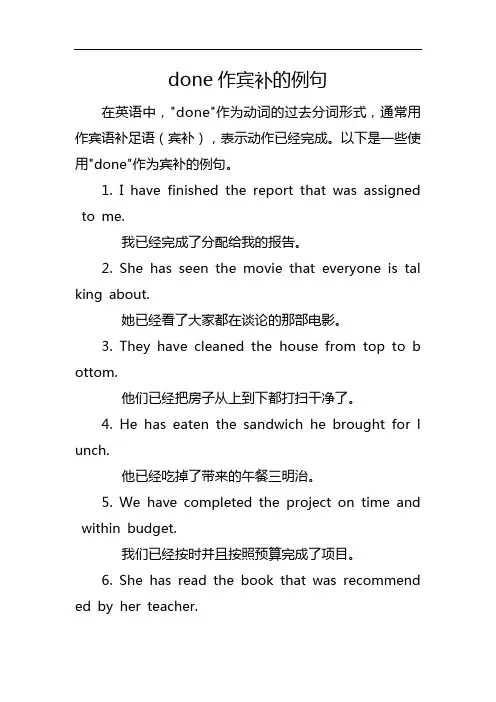
done作宾补的例句在英语中,"done"作为动词的过去分词形式,通常用作宾语补足语(宾补),表示动作已经完成。
以下是一些使用"done"作为宾补的例句。
1. I have finished the report that was assigned to me.我已经完成了分配给我的报告。
2. She has seen the movie that everyone is tal king about.她已经看了大家都在谈论的那部电影。
3. They have cleaned the house from top to b ottom.他们已经把房子从上到下都打扫干净了。
4. He has eaten the sandwich he brought for l unch.他已经吃掉了带来的午餐三明治。
5. We have completed the project on time and within budget.我们已经按时并且按照预算完成了项目。
6. She has read the book that was recommend ed by her teacher.她已经读了她老师推荐的这本书。
7. They have fixed the computer that was brok en.他们已经修好了那台坏掉的电脑。
8. I have written the letter to the editor that I promised to do.我已经写了我答应要写的给编辑的信。
9. He has learned the new software that is nec essary for his job.他已经学会了工作中必要的新软件。
10. We have sold the old car that was taking up space in the garage.我们已经卖掉了占用车库空间的那辆旧车。
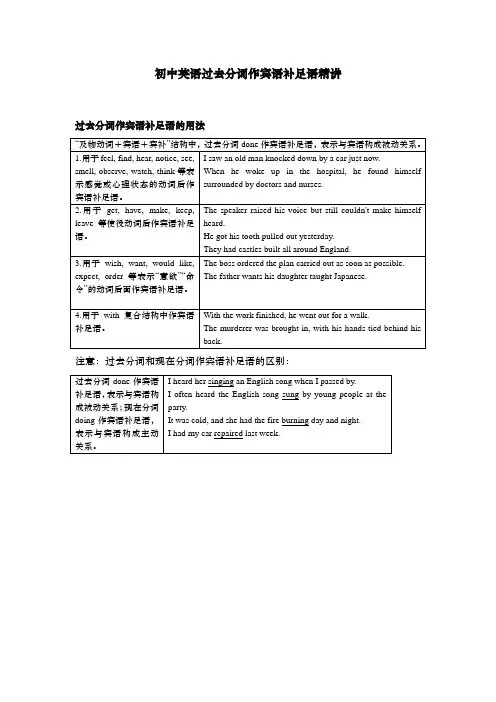
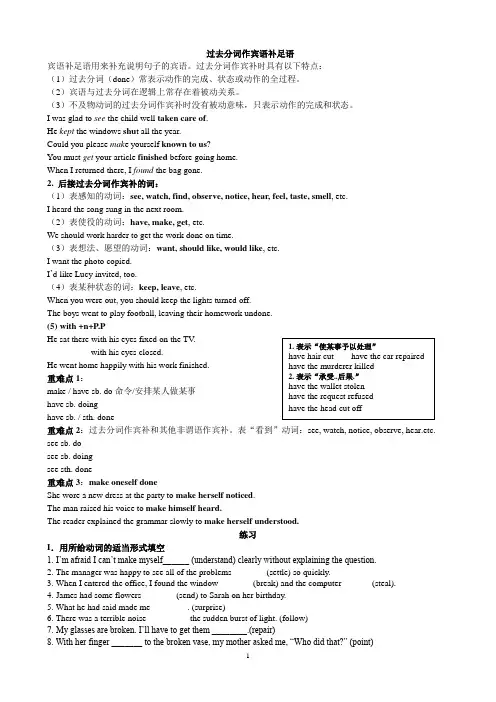
过去分词作宾语补足语宾语补足语用来补充说明句子的宾语。
过去分词作宾补时具有以下特点:(1)过去分词(done )常表示动作的完成、状态或动作的全过程。
(2)宾语与过去分词在逻辑上常存在着被动关系。
(3)不及物动词的过去分词作宾补时没有被动意味,只表示动作的完成和状态。
I was glad to see the child well taken care of .He kept the windows shu t all the year.Could you please mak e yourself known to us ?You must get your article finished before going home.When I returned there, I found the bag gone.2. 后接过去分词作宾补的词:(1)表感知的动词:see, watch, find, observe, notice, hear, feel, taste, smell , etc.I heard the song sung in the next room.(2)表使役的动词:have, make, get , etc.We should work harder to get the work done on time.(3)表想法、愿望的动词:want, should like, would like , etc.I want the photo copied.I ’d like Lucy invited, too.(4)表某种状态的词:keep, leave , etc.When you were out, you should keep the lights turned off.The boys went to play football, leaving their homework undone.(5) with +n+P.PHe sat there with his eyes fixed on the TV . with his eyes closed. He went home happily with his work finished. 重难点1: make / have sb. do 命令/安排某人做某事 have sb. doing have sb. / sth. done重难点2:过去分词作宾补和其他非谓语作宾补。
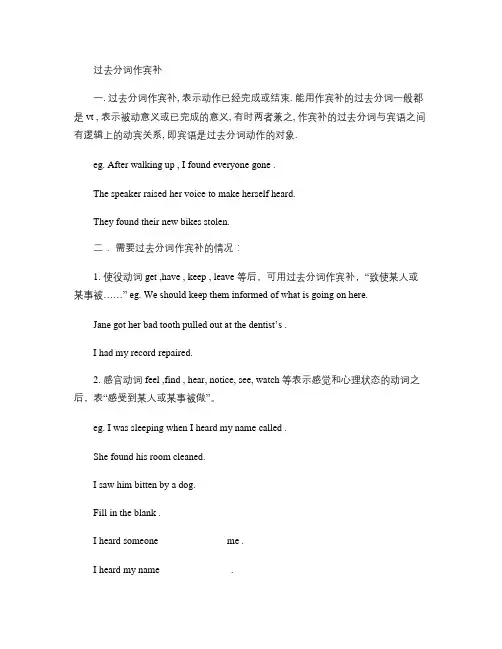
过去分词作宾补一. 过去分词作宾补, 表示动作已经完成或结束. 能用作宾补的过去分词一般都是vt , 表示被动意义或已完成的意义, 有时两者兼之, 作宾补的过去分词与宾语之间有逻辑上的动宾关系, 即宾语是过去分词动作的对象.eg. After walking up , I found everyone gone .The speaker raised her voice to make herself heard.They found their new bikes stolen.二.需要过去分词作宾补的情况:1. 使役动词 get ,have , keep , leave 等后,可用过去分词作宾补,“致使某人或某事被……” eg. We should keep them informed of what is going on here.Jane got her bad tooth pulled out at the dentist’s .I had my record repaired.2. 感官动词feel ,find , hear, notice, see, watch 等表示感觉和心理状态的动词之后,表“感受到某人或某事被做”。
eg. I was sleeping when I heard my name called .She found his room cleaned.I saw him bitten by a dog.Fill in the blank .I heard someone _____________ me .I heard my name ______________.I found Tom __________ the window.I found the window___________.3. 表示“意欲,命令”的动词如:like , order , want , wish , 相当于过去分词短语前省略了 to be, 表示“希望/要求某人或某事被做”。
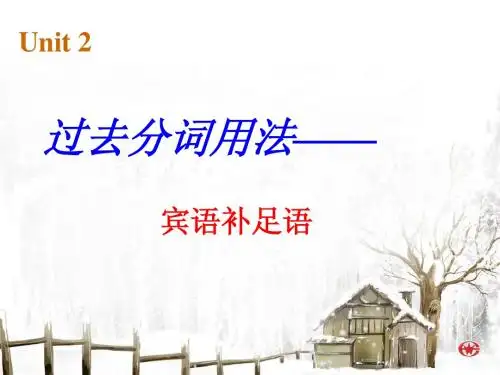
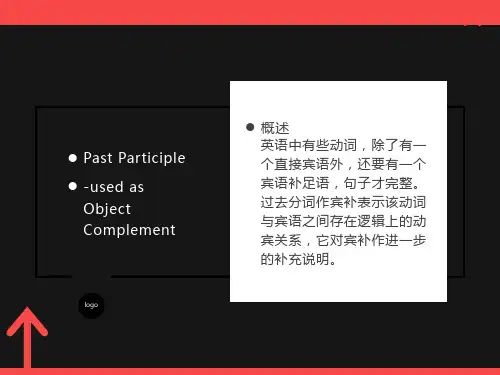
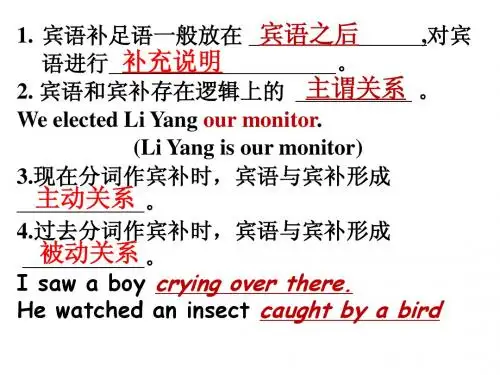
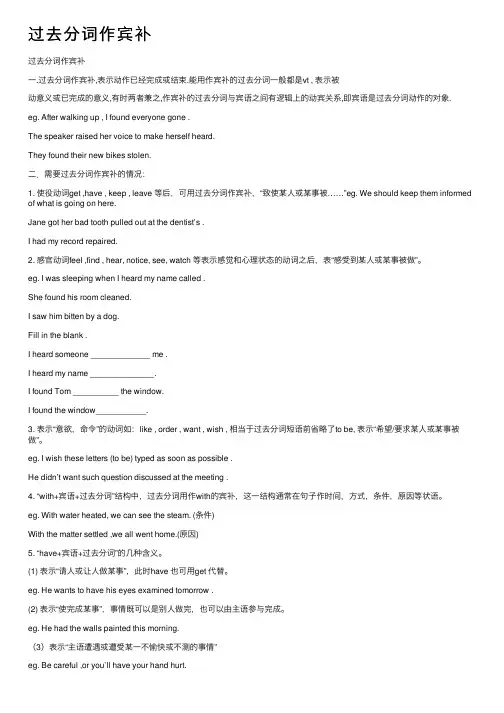
过去分词作宾补过去分词作宾补⼀.过去分词作宾补,表⽰动作已经完成或结束.能⽤作宾补的过去分词⼀般都是vt , 表⽰被动意义或已完成的意义,有时两者兼之,作宾补的过去分词与宾语之间有逻辑上的动宾关系,即宾语是过去分词动作的对象. eg. After walking up , I found everyone gone .The speaker raised her voice to make herself heard.They found their new bikes stolen.⼆.需要过去分词作宾补的情况:1. 使役动词get ,have , keep , leave 等后,可⽤过去分词作宾补,“致使某⼈或某事被……”eg. We should keep them informed of what is going on here.Jane got her bad tooth pulled out at the dentist’s .I had my record repaired.2. 感官动词feel ,find , hear, notice, see, watch 等表⽰感觉和⼼理状态的动词之后,表“感受到某⼈或某事被做”。
eg. I was sleeping when I heard my name called .She found his room cleaned.I saw him bitten by a dog.Fill in the blank .I heard someone _____________ me .I heard my name ______________.I found Tom __________ the window.I found the window___________.3. 表⽰“意欲,命令”的动词如:like , order , want , wish , 相当于过去分词短语前省略了to be, 表⽰“希望/要求某⼈或某事被做”。
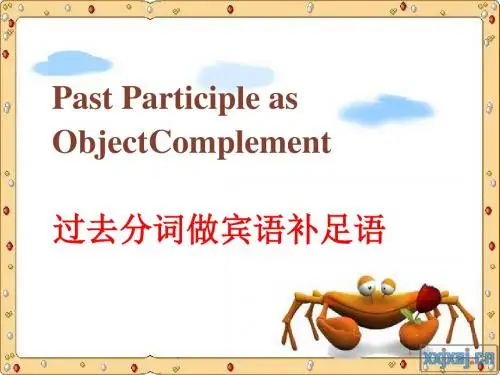
过去分词作宾补的四种情况过去分词作宾补的情况一:表示感觉或心理状态当我们在学习英语语法的时候,过去分词作宾补是一个很重要的知识点。
今天咱们就来聊聊过去分词作宾补表示感觉或心理状态的情况。
比如说,“I was surprised to find my room cleaned.”(我惊讶地发现我的房间被打扫干净了。
)在这个句子里,“cleaned”就是过去分词作宾补,它让我们感受到了“我”那种意外和惊喜的心情。
再比如,“She felt disappointed at the result.”(她对结果感到失望。
)“disappointed”在这里补充说明了“she”的感受。
我有个朋友叫小李,他一直期待能在考试中取得好成绩。
当成绩出来的时候,他发现自己考得很差,心里觉得非常 frustrated(沮丧的)。
这种感觉就像是心里有一块大石头压着,让他喘不过气来。
还有一次,我去参加一个聚会。
本来满心欢喜地以为会玩得很开心,结果发现大家都不太搭理我,那一刻我 felt left out(被忽视的),那种滋味可不好受。
所以啊,过去分词作宾补表示感觉或心理状态,能让我们更生动地表达自己的内心世界,让别人更好地理解我们的感受。
过去分词作宾补的情况二:表示使役咱接着说过去分词作宾补,这次来聊聊表示使役的情况。
比如说,“Have the work finished five o'clock.”(五点之前把工作完成。
)这里的“finished”就是过去分词作宾补,表示让工作被完成。
再举个例子,“He got his bike repaired.”(他让人修了他的自行车。
)“repaired”表明自行车被修理了。
我邻居王大爷的电视坏了,他请了个师傅来修, got his TV repaired,又能愉快地看电视啦。
还有我同学小张,头发太长了,就去理发店 had his hair cut,整个人都精神了不少。
有一回我家灯不亮了,我赶紧找人 had the light fixed,不然晚上可就黑漆漆的啦。
过去分词作宾补的三种类型类型一:动词+宾语+过去分词【典例】I couldn’t believe my ears when I heard my n ame _______ (mention) on the radio.【解析】由于mention与其前用作宾语的my name之间为被动关系,故用过去分词mentioned。
句意为:听到收音机里提到我的名字,我简直不相信自己的耳朵。
【拓展】注意体会下面句子中的“动词+宾语+过去分词”结构:I noticed their car parked outside. 我注意到他们的车子停在外面。
I don’t speak good French, but I can make myself un derstood. 我说不好法语,但我能使别人听懂我的话。
It can be cheaper to stump up for a new washing mach ine than to get your old one repaired. 掏钱买个新的洗衣机可能比你修理旧的还要更便宜。
类型二:介词with+宾语+过去分词【典例】With everything ________ (take) into considerati on, we all think this is a very good plan.【解析】根据短语 take everything into consideration(将每一件事都考虑到)可知,动词take与everything之间为动宾关系,而在本题中everything位于动词take之前,显然这里的eve rything应该是指“被考虑”,故填过去分词taken。
句意为:每件事都考虑到了,我们都认为这是一项不错的计划。
【拓展】注意体会下面句子中的“with+宾语+过去分词”结构:He sat in the chair with his legs crossed. 他盘着双腿坐在椅子上。
Grammar Unit2 过去分词作宾补过去分词作宾补用法归纳英语中过去分词可作宾补,即:过去分词放在宾语(名词或代词)后面作补语,构成复合宾语,(此时的过去分词一般是及物动词)表被动意义或完成意义,有时两者兼而有之。
做宾补的过去分词与宾语有逻辑上的动宾关系,即宾语是过去分词动作的对象。
1)表示感觉或心理状态的动词。
如:see, watch, observe, find, hear, feel, notice, 等。
①We saw the thief caught by the police.②People found the water polluted.③Have you heard a pop song sung in English④I heard my name called.⑤The rich man felt himself cheated.⑥We can hear the windows beaten by the heavy rain drops.>我们可以听到大雨敲打窗户的声音。
⑦I observed all the rooms broken into.注意:see, hear, watch, notice 等动词后既可以加v-ing 也可以用do(不带to的不定式),还可以跟done,但三者之间有区别: 用v-ing 表示动作正在发生,即发生的过程还没有结束; 用do强调动作发生的全过程,即动作全过程结束了,用done 表示宾语与宾补之间时被动的关系①I saw her come into the classroom.我看到他进了教室。
②I saw her coming into the classroom.我看他正在走进教室。
③I saw her taken out of the classroom.我看到她被带出了教室。
2)表示“致使”意义的动词。
如:have, make, get等。
过去分词作宾语补足语例句过去分词作宾语补足语是英语语法中的一种常见结构,用于补充说明宾语的状态或特征。
下面是十个例句,展示了过去分词作宾语补足语的用法和意义。
1. The cake was eaten by the children. (蛋糕被孩子们吃掉了)2. The book was written by a famous author. (这本书是一位著名作家写的)3. The window was broken by a stray baseball. (窗户被一只流浪的棒球打碎了)4. The car was repaired by a skilled mechanic. (这辆车被一位熟练的机械师修理了)5. The house was built in the 19th century. (这座房子是在19世纪建造的)6. The computer was fixed by a technician. (电脑被一位技术员修好了)7. The letter was written in blue ink. (这封信是用蓝色墨水写的)8. The table was set with fine china. (这张桌子上放着精美的瓷器)9. The picture was painted by a famous artist. (这幅画是一位著名艺术家创作的)10. The problem was solved by a team of experts. (这个问题被一组专家解决了)以上例句中,过去分词作为宾语补足语,进一步说明了宾语的状态或特征。
根据句子的语境,过去分词的形式有时会发生变化(如过去分词前加上助动词“be”),以表达不同的时态或语态。
过去分词作宾语补足语的用法在英语中非常常见,掌握好这种结构的用法能够帮助我们更准确地表达自己的意思。
Grammar: The Past Participle used as the object complement
(过去分词作宾语补足语)
一.什么是宾语补足语?
在英语中,有些动词除了一个宾语外,还需要一个成分来补充说明宾语的动作、身份、内容或状态。
这样,句子意义才能表达完整,这种成分在英语中被称为宾语补足语。
宾语补足语用来说明宾语的
His joke makes me happy
When they got there, they found the bank robbed
二. 过去分词作宾语补足语的意义:表被动/完成
及物动词的过去分词
过去分词
不及物动词的过去分词:
1.及物动词的过去分词作宾补时,宾语和过去分词之间是被动完成的关系或仅仅是被动关系。
He didn't notice his wallet stolen
I want the letter posted
The manager doesn’t like such questions discussed at the meeting
2.不及物动词的过去分词(如go ,fall, change等)作宾补时,仅表示“完成”,宾语和过去分词之间无被动关系。
She found her necklace gone on her way home.(只表完成)
二.过去分词作宾补的几种情况:
1.用在感官动词或心理状态的动词,如watch, notice, see, hear, feel, listen to,think ,find, 等词的宾语之后作宾补。
We can hear the windows beaten by the rain drops.
When we got to school, we found the door locked.
2.用在使役动词,如have, make, keep, get,leave等词的宾语之后作宾补.
They kept the door locked for a long time.
Don’t leave the windows broken like this all the time.
(特别注意:have sth done可表示三种含义:)
①表示“使某物/某事被做”(由别人做),此时have可用get 代替。
He wants to have his hair cut tomorrow.
I’ll get my computer fixed this afternoon.
②表示“完成或解决某事”(事情是自己做或自己参与)
They had many trees planted.
I must have the work finished before Sunday
③表示主语自身遭遇或遭受某种不幸、打击
He had his leg broken in the accident.
I had my wallet stolen in the bus.
3.用在表示愿望,希望,命令这一类动词,如wish, want, like, expect, order等词的宾语之后作宾补。
The teacher would not like the problem discussed at the moment.
I want the dress made to my own measure.
4. 用在“with+宾语+宾补”这一结构中
adj./adv.(表示宾语所处的状态)
现在分词(表主动/进行)
with +宾语+过去分词(表被动/完成
(这一结构可作状语和后置定语)
不定式(侧重于将来)
介词短语(表伴随)
I want to have a garden (with many flowers planted)
后置定语
1.He likes sleeping with the window open.
2.He fell asleep with the light on
3.With so many children laughing and talking ,the room was lively.
4.The boy went out to play with his homework unfinished.
5.With much work to do, I can’t go out with you
6.Miss Gao came into the classroom with a book in her hand.
三.现在分词、过去分词、动词不定式作宾语补足语的区别:
1.宾语与宾补之间的关系若是主动或进行的关系时,宾补用现在分词。
I heard them singing in the room when I passed
2.宾语与宾补之间的关系若是被动或完成的关系时,宾补用过去分词。
The teacher explained the problem several times but still couldn’t make himself understood (make oneself understood:使自己被理解/把自己的意思表达清楚)
3.不定式作宾语补足语侧重将来的动作(不定式所表示的动作发生在将来)
With much work to do, he had to get up early.。